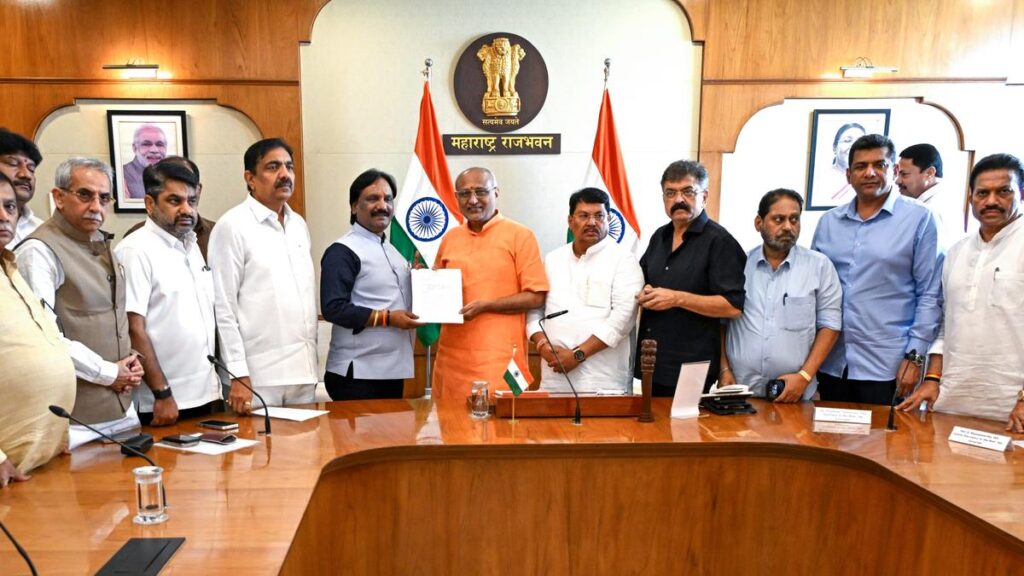
MLAs of the Maha Vikas Aghadi submit a memorandum to Maharashtra Governor C. P. Radhakrishnan to review the Maharashtra Special Public Security Bill of 2024, in Mumbai on July 18.
| Photo Credit: ANI
The story so far: The Maharashtra Legislature passed the Maharashtra Special Public Security Bill or a ‘Bill to provide for effective prevention of certain unlawful activities of Left Wing Extremist organisations or similar organisations’, during the recent monsoon session of the Maharashtra Assembly. The Bill has been termed as ‘oppressive, ambiguous and open to misuse’ by opposition leaders.
What is the Bill?
The Maharashtra Special Public Security Bill was brought in to counter ‘urban Naxalism’, as per the government of Maharashtra. The Bill states that, “the menace of Naxalism is not only limited to remote areas of the Naxal affected States but its presence is increasing in the urban areas also through the Naxal frontal organisations. The spread of active frontal organisations of the Naxal groups gives constant and effective support in terms of logistics and safe refuge to their armed cadres. The seized literature of Naxals shows ‘safe houses’ and ‘urban dens’ of the Maoist network in the cities of the State of Maharashtra.” The Maharashtra government claims that the State has become a safe haven for ‘urban Naxal’ organisations. It has said that over 60 such organisations exist in Maharashtra, and that current laws are ineffective against them. However, civil rights activists say that the State government has not yet made public the list of these organisations, despite repeated requests. They have alleged that the Bill has been brought about to control left-wing organisations and civil rights activists who had rallied against the BJP in the 2024 Parliamentary elections.
What about other States?
Maharashtra is the fifth State after Chhattisgarh, Telangana, Andhra Pradesh and Odisha to enact a Public Security Act “for more effective prevention of unlawful activities of such organisations.” The government has claimed that the other States have banned 48 frontal organisations under similar laws. But civil rights activists contend that the Public Security Acts in other States were brought in before the promulgation of more stringent pieces of legislation like the Unlawful Activities (Prevention) Act. They said that the Maharashtra government itself has claimed to have curbed left-wing armed extremists to only two districts of the State, with the help of currently existing laws, thus questioning the need for such a stringent Act at this time.
When was the Bill introduced?
The Bill was first introduced by the earlier Mahayuti government at the fag end of the monsoon session of Maharashtra Assembly in 2024. The State elections were held thereafter, and the BJP came back to power along with its allies with a thumping majority. The new government revived the Bill and introduced it during the winter session of the Maharashtra Assembly on December 20, 2024. A day later, a joint committee of members from both the Houses was formed to scrutinise the Bill. The committee received over 12,500 suggestions and objections but made only three amendments to the draft Bill. The activists have called the three changes ‘minor’. After being cleared by the joint committee, the Bill was tabled in the Legislative Assembly on July 10. Only the Communist Party of India (Marxist) opposed the Bill. Other opposition parties raised objections, but did not oppose the Bill, which was passed by a majority by a voice vote. Two delegations have since met the Governor requesting him to not sign the Bill and send it back to the Legislature instead.
What are the objections to the Bill?
The opposition has said that the Bill empowers the government to declare organisations ‘illegal’ without due process; allows suppression of facts in ‘public interest’; allows the government to extend ban on an organisation without any limit on the duration; has the potential to criminalise regular opposition under an ambiguous definition of ‘illegal activity’; excludes lower courts from jurisdiction, effectively closing off easy judicial remedies; provides full protection to State officials acting in ‘good faith’; and creates grounds for ideologically motivated action against opposition groups, activists and movements. The government has said that democratic and peaceful protests as well as journalists will not come under the Bill’s ambit, but the ambiguity in the Bill has given rise to fear that it might be used against farmers’ organisations, students’ groups, and civil rights groups under the label of ‘threat to public order’.
For example, Section 2(f) of the Bill criminalises speech (spoken or written), signs, gestures or visual representations which ‘tend to interfere’ with public order or ‘cause concern’. The opposition has said that such a provision allows authorities to criminalise expression, assembly, criticism, ridicule and association merely by indicating that they pose a potential threat. There is no requirement of actual violence, immediate harm or intent.
What next?
The Bill will become a law once the Governor gives his assent to it. It has been passed by both the Houses and has been sent to him. Meanwhile, civil rights activists and political parties have said they will continue to protest against the Bill and will approach the court against it.
Published – July 29, 2025 08:30 am IST

